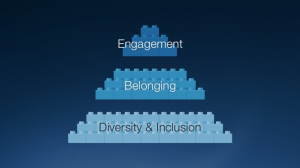After a testing adolescence of soul-searching, digital marketing has grown up, and this has opened a, gap in which to develop a competitive edge.
A recent survey – ‘Four Advantages of a Planned Approach to Digital Maturity’ – by US digital giant Adobe suggests the digital brands that are making waves have matured. Where in recent times the content marketing game focused more on assembling a portfolio of technical tricks, like those used in SEO, and digging through mountains of metrics, those companies that have applied ‘holistic improvements’ to their digital strategy are the ones that are really vying for long term gains.
We’ve developed the tech and the tactics to create and measure how we reach our audiences; the smart companies use that knowledge, process and infrastructure to enhance the user experience, and employ people that can adapt and improve to achieve real business goals. In other words, we’ve built the engine, now we need to drive the car.
Planning to be mature
And here’s the rub: of 1000 digital marketers surveyed, spanning a range of industries, Adobe crucially found that just 19% have made specific plans and investments to mature their digital strategy.
In contrast, 36% have witnessed some form of digital maturity but never planned for it, and a sizeable 45% haven’t made a plan to mature their digital marketing at all, simply letting themselves be carried along by the tide.
But let’s go back to those one in five companies that are actually investing in becoming more digitally mature. What are they doing that’s different?
Tech + people
Primarily they align their technology and media investments with human resources; they put the right people behind the wheel. These are the people that can take a new channel or process and react with the audience and business in mind.
Such firms only introduce new technology or a new hire into the mix when the support is in place to ensure that investment is maximised. These firms constantly adapt in the context of their business goals, and every improvement to a process is the result of multiple departments testing data that supports the change. For example, firms that mature digitally are over three times more likely to be engaged in multivariate testing to make incremental gains over competitors.
This is especially true in the case of mobile – a major factor in adapting to and improving the customer experience, because that’s where the customers are.
Many ‘immature’ companies fall down in this area by implementing responsive design that doesn’t address genuine customer need. While only 23% of marketers reported that they planned to improve their mobile experiences through A/B or multivariate testing, mature companies are twice as likely to regularly analyse their mobile app metrics,.
A further 78% of companies with a digital maturity strategy reported that they analyse web metrics, as you’d expect. What is perhaps unexpected is that 22% of businesses don’t. It may seem like a contingent of corporations are steaming ahead, but opportunities will always arise for the smart marketer.
How can I mature?
Put simply, accept that digital maturity must be top of your marketing agenda in order to change company culture and allow some necessary risk-taking. Leadership is key here.
Digitally maturing companies have moved past looking for the right processes. According to MIT Sloan Management Review and Deloitte Digital’s recent report, these firms place their digital work firmly on their bottom line and are four times more likely to employ people with the right skills. One such skill is the ability to articulate the value of digital tech in achieving company growth.
The people guiding digital strategy, whether the content manager or an agency, need to know which technology and processes work and why, and be able to communicate this to senior stakeholders. They need to have the freedom to hire or develop the right people to make the most of this knowledge, and they must be comfortable pushing the boat out and prepared to learn and adapt from failures.
MIT Sloan Management Review finds that the majority of people between the ages of 22 and 60 want to work for a digitally enabled organisation. Of those currently working in digital organisations, 91% believe that digital technologies have the power to transform the way they work. However, only 43% are actually satisfied with how their company reacts to digital trends.
It’s time to fundamentally re-think your digital strategy, putting business nous and creative risk-taking behind technical process. There are still a great number of companies paying lip service to digital and missing out on the opportunity for significant growth and change. This means there are still countless opportunities to be outstanding, but first you have to recognise what needs to change about your attitude to digital in order to play with the big boys.
Digital & Social Articles on Business 2 Community
(141)





